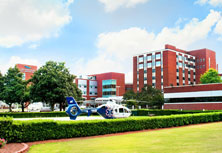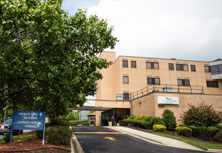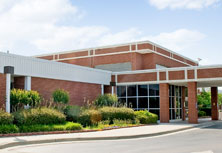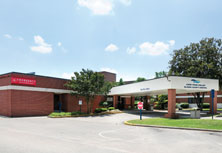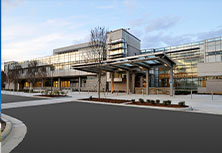Psychiatry Residency Program
Psychiatry Educational Goals
During training, under the direct supervision of an attending physician, the resident will attain a level of competence that will qualify them to become a certified physician in psychiatry or allow the resident to seek specialized training in the field of psychiatry. Satisfactory levels of accomplishment must be demonstrated in the cognitive, ethical and professional aspects of patient management. Upon satisfactory completion of the Psychiatry Residency Program at our institution, the resident at each level should by the end of each year:
PGY1
- Gather essential and accurate information about their patients including a comprehensive and appropriate medical and psychiatric history.
- Integrate and apply available clinical data to identify, define, prioritize, and assess a patient's problems, including development of a differential diagnosis.
- Make appropriate use of diagnostic studies and tests.
- Develop, negotiate and implement effective patient management plans with guidance from supervisory residents and faculty.
- Understand indications, techniques, risks and benefits, and proper patient education regarding performance of common medical, psychiatric and invasive procedures, as well as, the appropriate psychomotor skills to competently assist with or perform these procedures under appropriate supervision.
- Develop clinically applicable knowledge of the basic and clinical sciences that underlie the practice of medicine and psychiatry using an open-minded and analytical approach.
- Apply this knowledge to clinical problem-solving, clinical decision-making and critical thinking.
- Identify strengths, deficiencies, and limits in their knowledge and expertise.
- Set learning and improvement goals.
- Identify and perform appropriate learning activities.
- Systematically analyze their practice, using quality improvement methods, and implement changes with the goal of practice improvement.
- Incorporate formative evaluation feedback into daily practice.
- Locate, appraise, and assimilate evidence from scientific studies related to their patients' medical and psychiatric problems.
- Use information technology to optimize learning.
- Participate in the education of patients, families, students, residents and other health professionals.
- Communicate effectively with patients, families, and the public, as appropriate, across a broad range of socioeconomic and cultural backgrounds.
- Communicate effectively with physicians, other health professionals, and health related agencies.
- Work effectively with others as a member or leader of a health care team or other professional group.
- Maintain comprehensive, timely, and legible medical records, as appropriate.
- Displays qualities of compassion, integrity and respect for others.
- Responsiveness to patient needs that supersedes self-interest.
- Respect for patient privacy and autonomy.
- Accountability to patients, society and the profession.
- Sensitivity and responsiveness to a diverse patient population, including but not limited to diversity in gender, age, culture, race, religion, disabilities, and sexual orientation.
- Adhere to principles of confidentiality, scientific/academic integrity, and informed consent.
- Timely participation in all required educational and administrative activities.
- Work effectively in various health care delivery settings and systems.
- Coordination of patient care within the health care system.
- Incorporation of considerations of cost awareness and risk-benefit analysis in patient and/or population-based care, as appropriate.
- Advocacy for quality patient care and optimal patient care systems.
- Work in interprofessional teams to enhance patient safety and improve patient care quality.
- Participate in identifying system errors and in implementing potential systems solutions.
- Demonstrate competence in the management of psychiatric emergencies and crisis situations.
- Demonstrate competence in the decision making regarding the pharmacologic management of acutely agitated patients.
- Demonstrate basic knowledge of risk assessment and management of acutely and chronically suicidal patients.
- Demonstrate an understanding of the basics of psychopharmacology, such as how to choose medications, dosing, assessment of side effects, and relevant laboratory tests.
- Demonstrate competence in the elements of the mental status exam, including tools for observation, assessment, and description.
- Communicate as a professional with patients, hospital staff, students, fellow residents and attending staff.
- Obtain a detailed psychiatric and medical history; perform and document a thorough mental status examination
- Initiate appropriate laboratory and psychological investigations or consultation with other professionals
- Develop DSM-V diagnostic and ICD-10, case presentation and formulation skills appropriate for first year residents
- Develop a differential diagnostic framework appropriate for first year residents
- Acquire knowledge and skills of the civil commitment process for psychiatry patients
- Understand the theory and clinical standards of assessing and managing inpatient psychiatric patients
- Acquire knowledge and skills assessing (physical, laboratory and radiological assessment) essential for medical causes of psychiatric syndromes
- Be able to perform a thorough neurologic history and examination with emphasis on localization in the nervous system
- Acquire knowledge and skills to review and manage acute and chronic neurological disorders
- Acquire initiatory (introductory) knowledge of psychiatric treatment modalities - psychological, pharmacological, and rehabilitative
PGY2
- Demonstrate competence in the care of more complex or severely ill patients including all the major psychiatric disorders, such as Schizophrenia, Bipolar, Major Depression, Anxiety disorders, Substance Use Disorders, and Personality Disorders.
- Demonstrate the application of basic psychiatric knowledge during evaluation and care of patients with more complex psychiatric problems.
- Demonstrate basic knowledge of psychiatric interventions including: behavior therapy, cognitive behavioral therapy, and community care for severe mental illness.
- Demonstrate substantial knowledge child development and basic/clinical neuroscience and how these relate to psychiatric diagnosis and treatment.
- Communicate effectively with patient care team and begin to assume leadership position within the team. Show foresight and planning in regards to patient care including performing concise and effective case presentations.
- Build on the initiatory / introductory knowledge and skills acquired during the first year of residency training
- Introduce more advanced knowledge in psychiatric methods of care, developmental stages of life and participate in research in psychiatry
- These goals are achieved by close supervision of residents on a variety of inpatient units and also by introducing residents to integrated continuum of care through dyadic - one-on-one supervisions, and didactic program of lectures in psychiatric assessment, treatment and research
- Develop a thorough competence in the assessment and bio-psycho-social formulation of psychiatric disorders
- Develop a comprehensive understanding of the psychological, pharmacological, and physical treatments involved in the care of the seriously mentally ill
- Be exposed to managing patients with severe and chronic / persistent mental illness in the community, these concepts include multi- disciplinary treatment teams, working with families, psychosocial rehabilitation and dual diagnosis
- Understand the key developmental stages throughout the life cycle, approach clinical assessment on a developmental continuum
- Be introduced to cultural psychiatry and its significance in psychiatric diagnosis and treatment
- Recognize and give appropriate emphasis to the individual and family strengths and community services which can be mobilized in the management of psychopathology
- Provide emergency psychiatric consultation
- Understand research hypothesis testing, including the concepts of independent and dependent variables
- Understand basic research designs and strategies.
PGY3
- Demonstrate competence as the "leader/supervisor" on a smaller psychiatric team with close attending supervision.
- Coordinate patient care to include appropriate evaluation and treatment by other health care professionals and consultants.
- Demonstrate mastery of basic psychiatric pathophysiology and patient care (ward), and a basic understanding of psychiatric alternatives.
- Demonstrate improved communication with patient care team and function more effectively as team leader.
- Communicate effectively with other health care professionals.
- Begin to address issues of problem solving and dispute resolution.
- Demonstrate an understanding of the role of different specialists and other health care professionals in overall patient management.
- To enhance competencies acquired in the first two years and develop mastery of assessment, and management of resistant-refractory disorders, special population, and more complex psychiatric cases / scenarios
- Acquire initiatory / introductory knowledge and skills in time-limited symptom-focused and long-term insight oriented psychological treatments by delivering psychotherapy, under close supervision, to selected patients followed in outpatient settings
- Proficient in gathering clinical data relevant to a psychiatric evaluation, arriving at correct diagnosis of psychiatric patients, and generate differential diagnosis for patients with psychiatric disorders
- Able to select, synthesize and appropriately balance the biological, developmental, familial, social and psychological factors contributing to psychopathology
- Be proficient in planning and implementing bio-psychosocial plans for patients with psychiatric disorder
- Effectively utilize the resources and skills of related mental health professionals Have gained experience and skills to the point of being regarded as a team leader by clinical colleagues
- Demonstrate competence in evaluation of the medical literature
PGY4
- Demonstrate an understanding of the role of different specialists and other health care professionals in overall patient management.
- To complete psychiatry residency training and prepare for post residency career
- To develop advanced experience in a psychiatric subspecialty through electives
- To become familiar with psychiatric administration through a weekly meeting with the Medical Director of one of the affiliated sites
- Have completed the core rotations as required by Psychiatry Residency Review Committee.
- Have a thorough and expert understanding of the psychological, social, economic, ethnic, family and biological factors that influence development as well as psychiatric illnesses and treatments
- Have achieved diagnostic and clinical skills at the level of a qualified general psychiatrist
- Have achieved consultative skills, and the ability to lead case discussions and present scholarly material at the level of a qualified general psychiatrist
- Communicate findings and recommendations to other professionals, referring physicians, community mental health agencies and, where appropriate, to the family and other services
- Have played a substantial role in the teaching of junior residents
- Have thorough knowledge and understanding of the various subspecialties in psychiatry through elective rotations and close mentoring by faculty members
- Understand the changing health-care environment and of the competencies necessary for success in clinical practice and in other professional leadership roles
- Have an appreciation of the rational approaches to administrative decisions within a system of psychiatric service.
